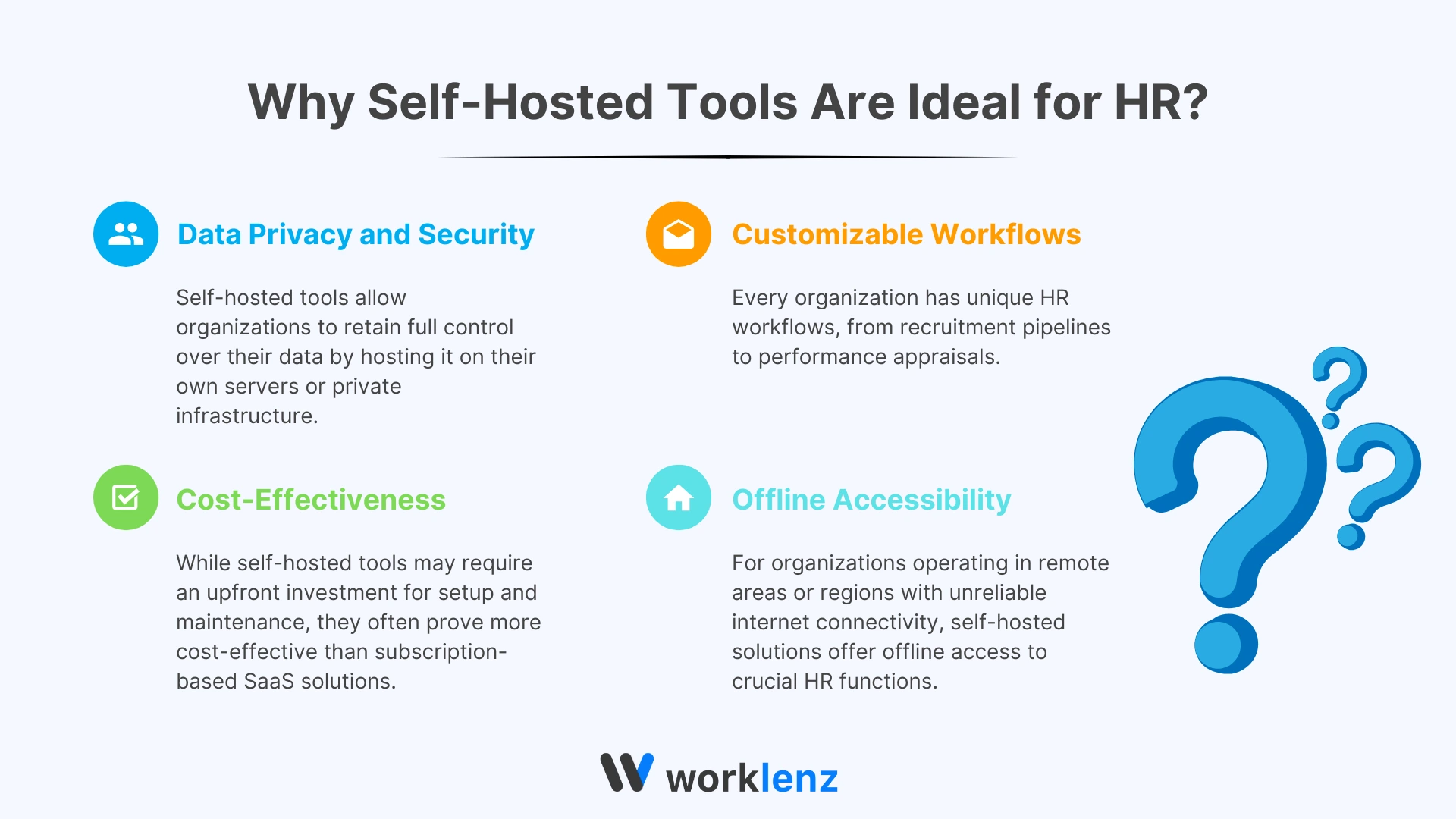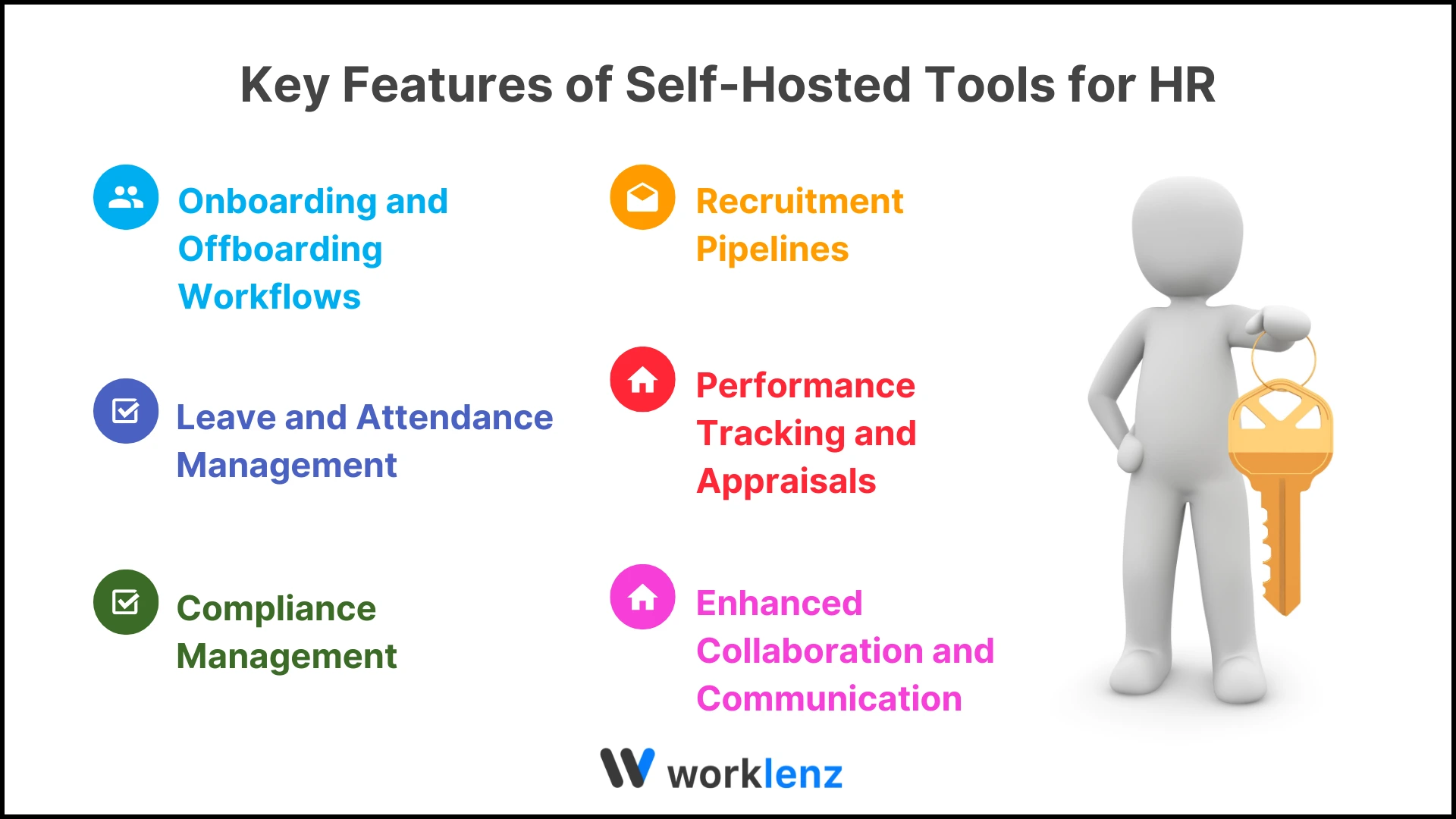How Self-Hosted Task Management Tools Enhance HR Efficiency

Human Resource (HR) operations are the backbone of any successful organization, ensuring that recruitment, onboarding, employee management, and compliance processes run smoothly. However, managing these critical tasks often comes with challenges, such as coordinating across teams, handling sensitive data, and streamlining workflows—all while maintaining efficiency and security.
Interesting fact
Did you know that over 60% of HR professionals report spending significant time on administrative tasks that could be automated or streamlined? This is where self-hosted task management tools come in, offering HR teams a more efficient and secure way to manage their operations.
Organizations can take control of their workflows, safeguard sensitive data, and customize their processes to fit their unique needs by adopting self-hosted tools. These solutions offer a streamlined, secure, and cost-effective approach to transforming HR operations, empowering teams to focus on what matters.
Why Self-Hosted Tools Are Ideal for HR
Human Resource departments deal with some of the most sensitive data within an organization—employee records, payroll information, and compliance documents. Ensuring this data remains secure while maintaining efficient operations is a challenge many HR teams face. This is where self-hosted task management tools stand out as a game-changing solution tailored to HR’s unique needs.

1. Enhanced Data Privacy and Security
Self-hosted tools allow organizations to retain full control over their data by hosting it on their own servers or private infrastructure. This eliminates reliance on third-party providers, significantly reducing the risk of data breaches or unauthorized access. For HR teams, this means sensitive employee data stays private and secure, meeting even the most stringent regulatory requirements.
2. Customizable Workflows for HR Processes
Every organization has unique HR workflows, from recruitment pipelines to performance appraisals. Self-hosted tools provide the flexibility to customize features and processes, ensuring they align perfectly with the team’s needs. Whether automating onboarding tasks or tracking employee evaluations, the ability to adapt the tool is a huge advantage.
3. Cost-Effectiveness in the Long Run
While self-hosted tools may require an upfront investment for setup and maintenance, they often prove more cost-effective than subscription-based SaaS solutions. HR teams can avoid recurring fees while enjoying long-term ownership and control of the software.
4. Offline Accessibility and Independence
For organizations operating in remote areas or regions with unreliable internet connectivity, self-hosted solutions offer offline access to crucial HR functions. This ensures uninterrupted operations, even in challenging circumstances.
By addressing these critical aspects, self-hosted task management tools empower HR teams to operate more securely, efficiently, and flexibly.
The Role of Task Management in HR Operations
HR operations encompass a wide range of responsibilities that are essential to keeping an organization running smoothly. From recruitment and onboarding to payroll and compliance, managing these tasks requires precision and coordination. Task management tools serve as a central hub for organizing, prioritizing, and automating HR workflows, ensuring nothing falls through the cracks.
Streamlining Recruitment and Onboarding
Recruitment involves juggling multiple tasks: posting job ads, reviewing applications, scheduling interviews, and communicating with candidates. A task management tool can centralize these activities, offering features like:
-
Kanban boards to track applicants through the hiring process.
-
Automated reminders for follow-ups and deadlines.
-
Document-sharing capabilities for contracts and offer letters.
Similarly, onboarding can be simplified by creating step-by-step task templates that ensure every new hire completes mandatory processes, such as document submission, orientation sessions, and IT setup.
Simplifying Leave and Attendance Management
Managing leave requests and tracking attendance manually can be time-consuming and prone to errors. Task management tools allow HR teams to automate approval workflows and maintain a transparent record of employee absences, ensuring seamless communication with payroll systems.
Tracking Performance and Goals
HR is integral to employee performance management. By using task management tools, HR teams can:
-
Assign and track goals for individual employees.
-
Schedule regular performance reviews.
-
Maintain records of feedback and evaluations.
Ensuring Compliance and Meeting Deadlines
Staying compliant with labor laws and regulations is non-negotiable for HR departments. Task management tools help HR teams:
-
Set reminders for compliance deadlines.
-
Monitor changes in regulations and update policies accordingly.
-
Store important compliance-related documents securely.
By integrating task management into their daily routines, HR teams can reduce manual effort, increase accuracy, and ensure the smooth execution of their responsibilities.
Key Features of Self-Hosted Tools for HR
To maximize efficiency and address the unique challenges of HR operations, self-hosted task management tools come equipped with features tailored to the needs of HR professionals. These tools not only streamline day-to-day activities but also offer customization options to align with organizational goals.

1. Onboarding and Offboarding Workflows
Managing employee entry and exit processes can be overwhelming without proper systems in place. Self-hosted tools provide:
-
Predefined templates for onboarding tasks such as setting up email accounts, equipment allocation, and training schedules.
-
Offboarding workflows that ensure exit interviews, return of assets, and clearance procedures are efficiently handled.
2. Recruitment Pipelines
Customizable pipelines enable HR teams to track candidates throughout the hiring process. From initial application to final offer, tools can:
-
Assign tasks for each hiring stage.
-
Monitor deadlines for interviews and feedback collection.
-
Generate reports to analyze recruitment efficiency.
3. Leave and Attendance Management
Self-hosted tools can simplify leave tracking by allowing employees to:
-
Submit leave requests directly through the system.
-
View remaining leave balances.
-
Enable HR teams to approve or decline requests with a single click while maintaining accurate attendance records.
4. Performance Tracking and Appraisals
Monitoring employee performance becomes easier with:
-
Goal-setting features that align with company objectives.
-
Regular task and milestone tracking for individual employees.
-
Automated reminders for appraisal cycles and feedback sessions.
5. Compliance Management
HR teams can avoid costly errors and penalties with tools that:
-
Set up reminders for compliance deadlines and audits.
-
Organize and store regulatory documents securely.
-
Track changes in labor laws and update relevant policies seamlessly.
6. Enhanced Collaboration and Communication
HR teams often work across departments. Self-hosted tools promote collaboration by offering:
-
Real-time updates on tasks.
-
Document sharing and annotation features.
-
Integration with internal communication tools for streamlined discussions.
By leveraging these features, HR teams can transform their workflows into efficient, automated processes while maintaining the flexibility to adapt to organizational changes.
Discover more about the role of task management in other teams in our article,The Role of Task Management Tools in Marketing Teams*
Real-World Example: Transforming HR with Self-Hosted Solutions
Let’s consider a real-world scenario to understand how self-hosted task management tools can revolutionize HR operations.
Improving HR Efficiency in a Mid-Sized Organization
A mid-sized company in the retail industry was facing challenges in managing its growing workforce. Their HR team struggled with:
-
Handling onboarding tasks for multiple new hires each month.
-
Managing compliance deadlines across multiple jurisdictions.
-
Tracking employee performance reviews and feedback cycles.
To address these issues, they implemented a self-hosted task management tool built on open-source technologies. Here’s how it helped:
Onboarding Efficiency
They created customized templates for onboarding tasks, ensuring every new hire received the same seamless experience. Automated notifications reduced manual follow-ups by 40%.
Compliance Tracking
With task reminders, the HR team never missed a compliance deadline. All regulatory documents were securely stored and easily accessible.
Performance Management
The tool allowed managers to set clear goals and track progress for each employee, boosting engagement and productivity.
Behind the Scenes: Building the Solution
The HR tool was built using well-supported open-source technologies such as PostgreSQL for database management and Django for web application development. The team chose these technologies for their reliability, scalability, and active community support.
1. License: The software was released under an AGPL license to ensure transparency and community collaboration.
2.GitHub Repository: Developers contributed to the project via an open GitHub repository, which also served as a roadmap for future enhancements.
This self-hosted approach not only solved the company’s HR challenges but also empowered them with complete control over their data, aligning with their privacy policies and long-term goals.
Explore self-hosted task management tools in our comparison article,Worklenz vs OpenProject: Which Tool is Right for Your Team?
Final Thoughts
Managing HR operations effectively requires a blend of precision, security, and adaptability—qualities that self-hosted task management tools excel at providing. By offering enhanced data privacy, customizable workflows, and robust features tailored to HR needs, these tools empower teams to focus on strategic initiatives rather than getting bogged down in administrative tasks.
In an era where data security and operational efficiency are paramount, self-hosted solutions represent a forward-thinking approach. They not only streamline HR processes but also provide organizations with the flexibility and control needed to adapt to future challenges.
Whether it’s managing recruitment pipelines, tracking employee performance, or ensuring compliance, self-hosted task management tools are a powerful ally for HR teams looking to optimize their workflows. As organizations continue to prioritize efficiency and security, these tools are poised to play a pivotal role in shaping the future of HR operations.